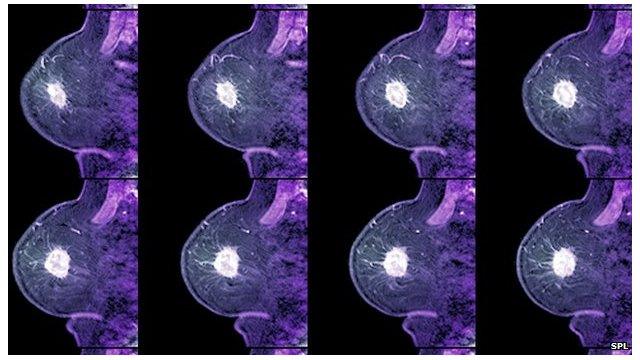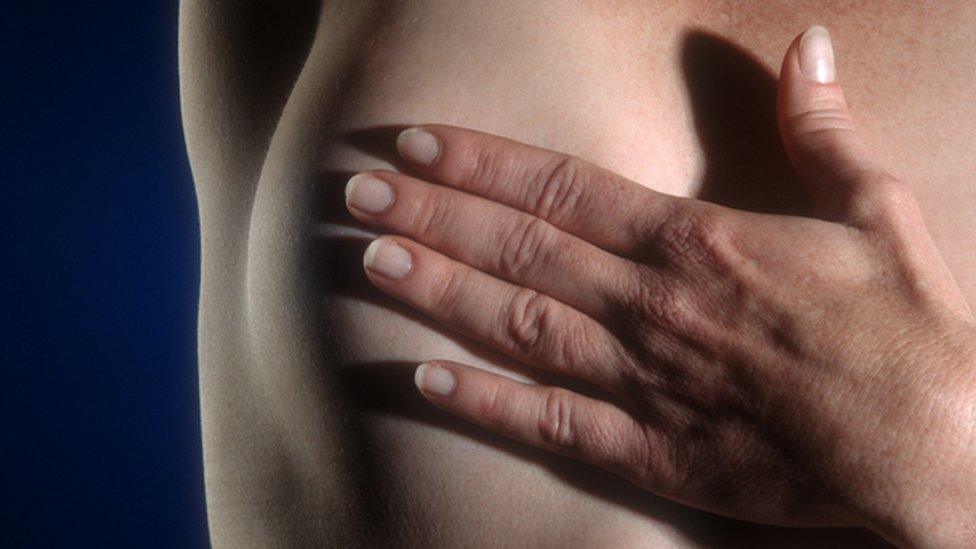Healthy women should take breast cancer pill, says NICE
- Published

Hundreds of thousands of healthy women should take pills to cut their risk of breast cancer, says NHS watchdog NICE.
The draft guidelines, external for England say women predisposed to breast cancer because of a strong family history of the disease need this protection.
There are now three drugs to choose from - tamoxifen, raloxifene and, for the first time, anastrozole.
Anastrozole is cheaper than the other two and, for some women, has fewer side-effects and is more effective.
Which one is best?
Trials show that per 1,000 patients taking anastrozole for five years, 35 cancer cases would be prevented compared with 21 for tamoxifen.
Which treatment is best for each woman will depend on her situation. If she is pre-menopausal, anastrozole won't be suitable because it knocks out the female hormone oestrogen, creating, in effect, a drug-induced menopause.
Clinical trials show anastrozole avoids two of tamoxifen's more serious side-effects - an increased risk of developing a blood-clotting disease, and an increased risk of developing womb cancer.
But anastrozole can make bones weaker and so it is not recommended for women with osteoporosis.

Women should discuss the relative merits and risks with their doctor when deciding which tablet to take.
Prof Mark Baker from NICE (National Institute for Health and Care Excellence) said: "Our draft guideline update recommends the use of anastrozole as a first-line treatment for post-menopausal women at high or medium risk of breast cancer who don't have osteoporosis.
"The evidence examined by the committee suggests anastrozole will not only reduce the number of breast cancer cases in these women compared to tamoxifen, but it is also a more cost-effective option."
Anastrozole costs about 4p a pill. The list price of tamoxifen is about 9p per tablet.
Baroness Morgan from the charity, Breast Cancer Now, was concerned that patients might not be able to access treatments, despite the recommendations.
Not all of the tablets are licensed for use as breast cancer prevention drugs. Doctors can still prescribe them off-label.
"This updated guideline is a great first step but we now need to ensure that these risk-reducing options actually make their way to patients that could benefit. Ultimately, if the full potential of anastrozole is to be realised for post-menopausal women, there needs to be far greater awareness and support for GPs in prescribing off-label treatments."
Some women find that the side-effects of these breast cancer pills are significant enough to stop them taking the medication.
Common side-effects, affecting at least one in every 10 women on the tablets, include hot flushes and sweats.
Breast cancer affects one in eight women in the UK. Most cases are not linked to a family history.
Around 5% of people diagnosed with breast cancer have inherited a faulty BRCA1 or BRCA2 gene.
If you have a faulty gene, it doesn't mean you'll definitely develop breast cancer, but you are at higher risk.
Out of every 100 women with a faulty gene, between 40 and 85 will develop breast cancer in their lifetime.
Genetic testing for breast cancer, external
Follow Michelle on Twitter, external
- Published12 December 2013

- Published22 September 2016

- Published8 November 2016
